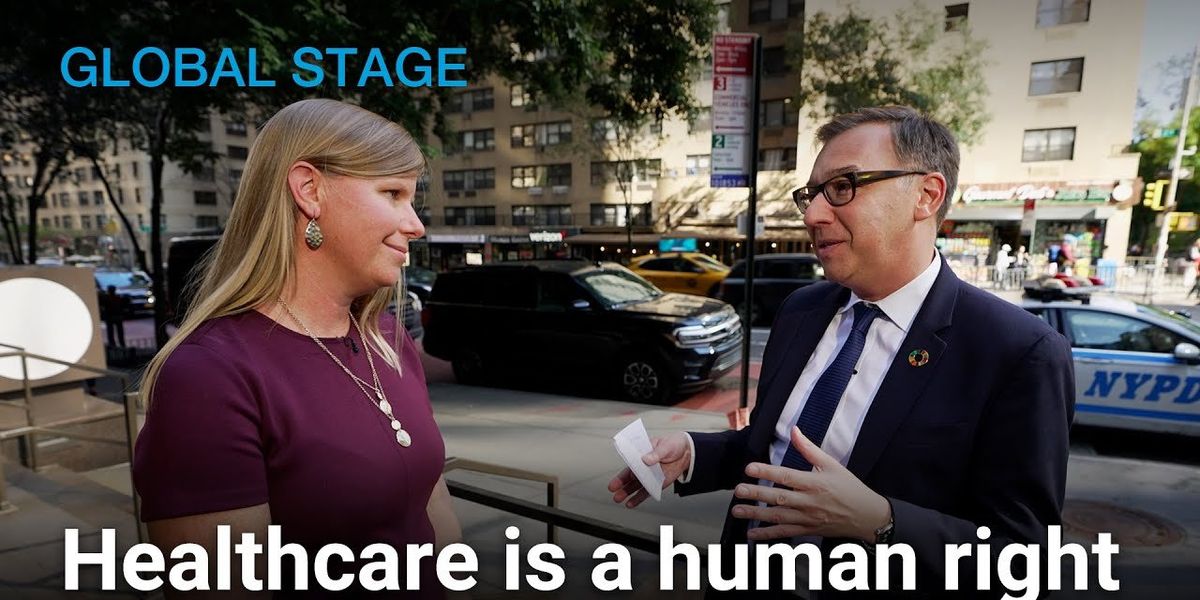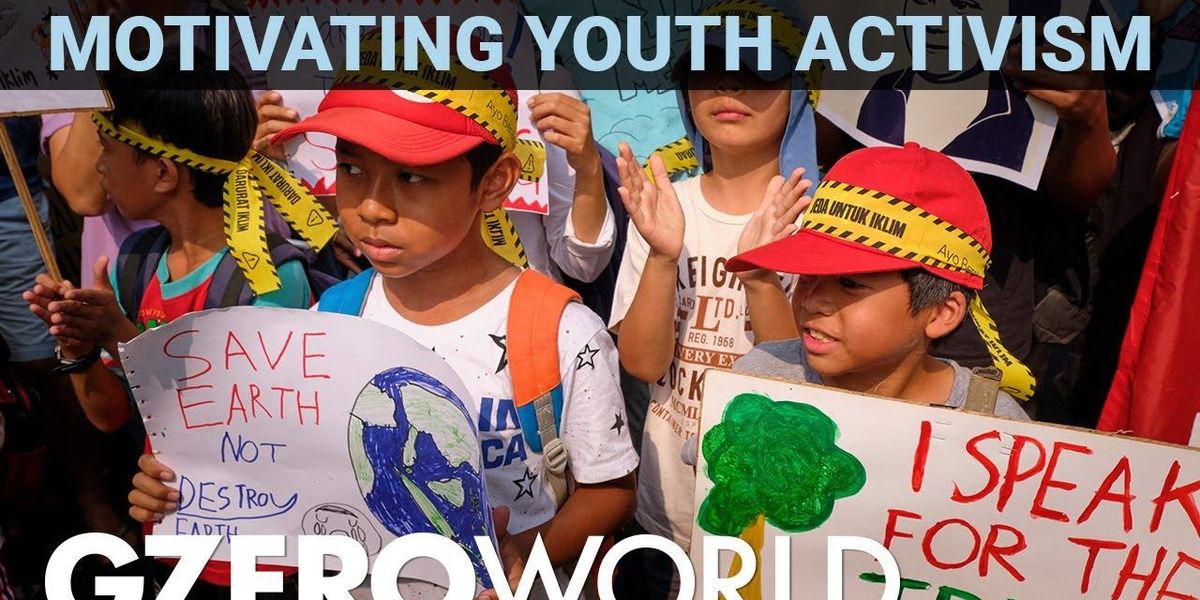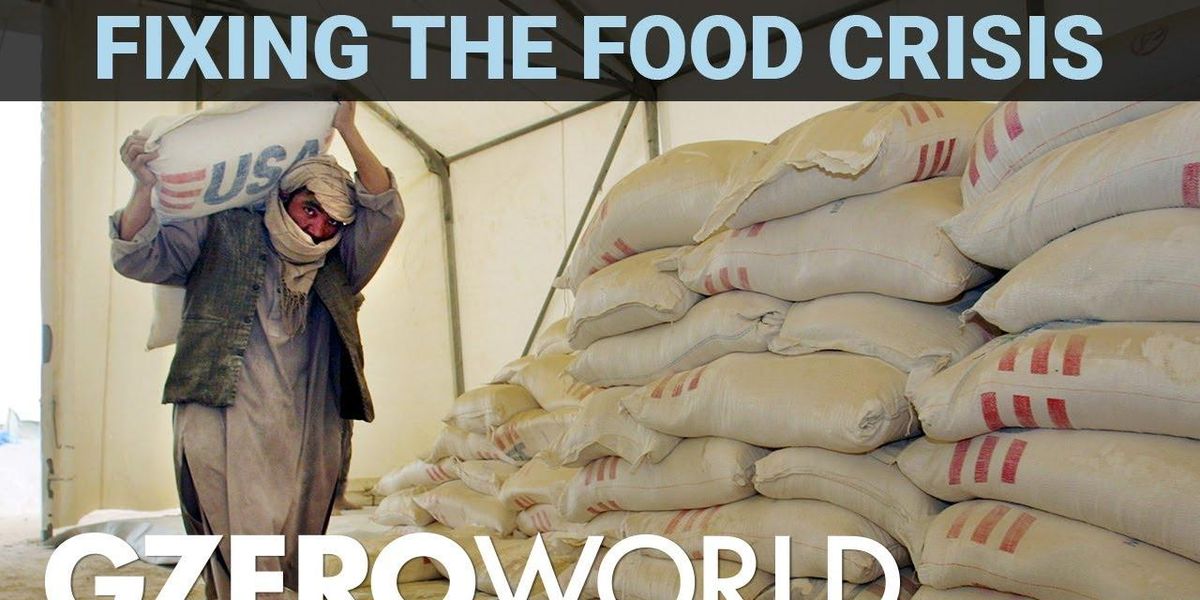Trending Now
We have updated our Privacy Policy and Terms of Use for Eurasia Group and its affiliates, including GZERO Media, to clarify the types of data we collect, how we collect it, how we use data and with whom we share data. By using our website you consent to our Terms and Conditions and Privacy Policy, including the transfer of your personal data to the United States from your country of residence, and our use of cookies described in our Cookie Policy.
{{ subpage.title }}
“Health is a human right”: How the world can make up progress lost to COVID
The state of public health in the developing world bears some deep scars from the COVID-19 pandemic. Over the past three years, immunization rates have dropped to levels not seen in three decades. 2 billion people are facing "catastrophic or impoverishing" health spending worldwide according to the World Health Organization. And governments in the Global South are taking on more and more debt at the expense of investment in health and social services.
Kate Dodson, the Vice President of Global Health Strategy at the UN Foundation, is on the frontlines of the fight to give the most vulnerable people in the world access to proper healthcare. She works to connect experts and innovators with the UN, and find resources to support their work.
She’s calling on governments to invest in basic elements of public health, including primary care access, and properly remunerating healthcare workers — the majority of whom are women, worldwide. And more fundamentally, she wants leaders to treat health as a human right that all deserve to enjoy.
More from Global Stage: https://www.gzeromedia.com/global-stage/
- Can surveillance prevent the next pandemic? ›
- Highlights from our live discussion on post-pandemic health security ›
- Eris on the rise ahead of predicted fall COVID wave ›
- China's COVID lockdowns made its people depressed and hurt its economy ›
- Ian Explains: Is the world better today thanks to human progress? - GZERO Media ›
- How can the world build back better public health after COVID? - GZERO Media ›
- Is life better than ever for the human race? - GZERO Media ›
Philanthropy's moment to act
Note: This interview appeared as part of an episode of GZERO World with Ian Bremmer, "Inequality isn't inevitable - if global communities cooperate" on January 29, 2023.
It's almost the first anniversary of Russia's war in Ukraine. On March 11, it'll be three years since the World Health Organization declared COVID-19 a pandemic. And 2022 was the sixth warmest year on record since 1880. We are still dealing with the fallout from all three events. But not equally. Since 2020, the richest 1% of people has accumulated nearly two-thirds of all the new wealth created in the world.
On GZERO World, Ian Bremmer speaks to UN Foundation President and CEO Elizabeth Cousens, who thinks it's the perfect time for institutions backed by the 1 percent to step up even more. Foundations have traditionally resisted going big on fixing the world's problems because they're in it for the long run. The stakes are so high and the crises so urgent that Cousens sees a window of opportunity for philanthropy to take swift action instead of their traditional long-term approach. When it comes to immediate and deadly problems like famine and flooding, an influx of money could start making a huge difference very quickly.
Watch the GZERO World episode: Inequality isn't inevitable - if global communities cooperate
How to save our future from the crises we create
Who has the most at stake in making the world a better place? Young people.
After all, the decisions we make today affect their future more than any other age group.
“Not just the young people who make up half of the world's population today, but the 11 billion people who are yet to be born by the end of this century," asks UN Foundation President Elizabeth Cousens, "what are we leaving to them?”
In a GZERO World interview with Ian Bremmer, Cousens offers some thought on what the youth can do for global development based her experience working with young people.
Watch the GZERO World episode: Inequality isn't inevitable - if global communities cooperate
Why philanthropic foundations need to spend money (and quickly)
In today's world, where global development needs are high and seismic geopolitical events have turned back the clock on so much progress, UN Foundation President Elizabeth Cousens says its the perfect time for philanthropy to step up.
Indeed, there's a lot more that can be done, Cousens tells Ian Bremmer on GZERO World.
And philanthropy, she explains, doesn't have to be about greenwashing or PR but rather a way of making things better in many places that have been through more than their fair share in recent years.
Cousens believes there's been a "real reckoning" among people and corporations who are "increasingly recognizing their contribution to the state of the world that is not particularly healthy." And there's the opportunity for them to do real good.
Watch the GZERO World episode: Inequality isn't inevitable - if global communities cooperate
Food emergency: what to do when people are hungry now
On global issues, the international community must walk and chew gum at the same time. It needs to learn to deal with simultaneous crises that play off each other, says UN Foundation President Elizabeth Cousens.
That's why we dropped the ball on hunger.
Now the needs are huge and growing. We haven't seen a lot of images of starvation yet, but they are coming, Cousens tells Ian Bremmer on GZERO World.
"We have to be able to rise to this challenge, and see it as something that's in both our interest," she says, adding that “we have done heroic things before on the humanitarian front — it's not like we're not collectively capable."
Watch the GZERO World episode: Inequality isn't inevitable - if global communities cooperate
"We're in this together" — UN Foundation chief
Global development has been going backwards since even before the pandemic, and there's no end in sight.
Extreme poverty is now rising again, and fraught politics at every level is making it harder to fight inequality around the world.
But it's not an irreversible trend, UN Foundation President Elizabeth Cousens tells Ian Bremmer on GZERO World.
“The challenge of our times," she says, is "to re-galvanize that spirit of 'we're in it together' — [that] we have more in common than we have that divides us.“
Watch the GZERO World episode: Inequality isn't inevitable - if global communities cooperate
Inequality isn't inevitable - if global communities cooperate
Almost three years after COVID, we're still grappling with the geopolitical convulsions that the pandemic unleashed or worsened. They're all wiping out decades of progress on fighting global inequality.
What's more, the world has become more unequal at a time when global cooperation is often an afterthought. So, what can we do about it?
On GZERO World, Ian Bremmer speaks to UN Foundation President and CEO Elizabeth Cousens, who thinks it's the perfect time for institutions backed by the 1 percent to step up even more.
Foundations have traditionally resisted going big on fixing the world's problems because they're in it for the long run. But now the stakes are so high and the crises so urgent that Cousens sees a "window" of opportunity for philanthropy to play a bigger role in global development.
The are real problems, she says, that money can solve immediately.
- The perils of depending on food imports: UN Foundation chief ›
- Podcast: Salvaging the world we leave our kids with innovative philanthropy ›
- In a food crisis, export controls are "worst possible" thing to do, says UN Foundation chief ›
- How a war-distracted world staves off irreversible damage ›
- How converging crises lowered education levels & intensified poverty ›
- Podcast: Fix the global debt crisis before it's too late, warns World Bank's David Malpass - GZERO Media ›
Podcast: Salvaging the world we leave our kids with innovative philanthropy
Listen: Global inequality has reached a level we haven’t seen in our lifetimes and recent geopolitical convulsions have only made things worse. The rich have gotten richer while extreme poverty has exploded. UN Foundation President Elizabeth Cousens thinks it's the perfect time for institutions backed by the 1% to step up. She speaks with Ian Bremmer on the GZERO World podcast about the key role that innovative philanthropy could play to address problems exacerbated by the war in Ukraine, economic fallout from the COVID pandemic, and a warming planet.
Why now? The stakes are so high and the crises so urgent that Cousens sees a window of opportunity for philanthropy to take swift action instead of their traditional long-term approach. When it comes to immediate and deadly problems like famine and flooding, an influx of money could start making a huge difference very quickly.
Subscribe to the GZERO World Podcast on Apple Podcasts, Spotify, Stitcher, or your preferred podcast platform, to receive new episodes as soon as they're published.- Is the world coming apart? Drama at Davos ›
- Global food crisis: when food isn't merely expensive ›
- In a food crisis, export controls are "worst possible" thing to do, says UN Foundation chief ›
- Podcast: The Ukraine war is crippling the world's food supply, says food security expert Ertharin Cousin ›
- Inequality isn't inevitable - if global communities cooperate - GZERO Media ›
- Philanthropy's moment to act - GZERO Media ›






